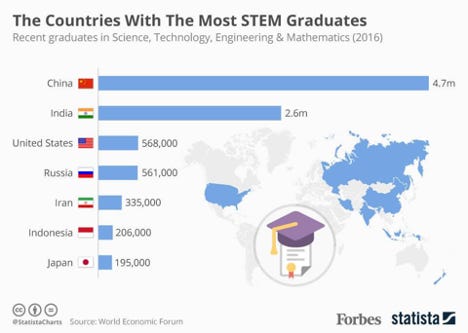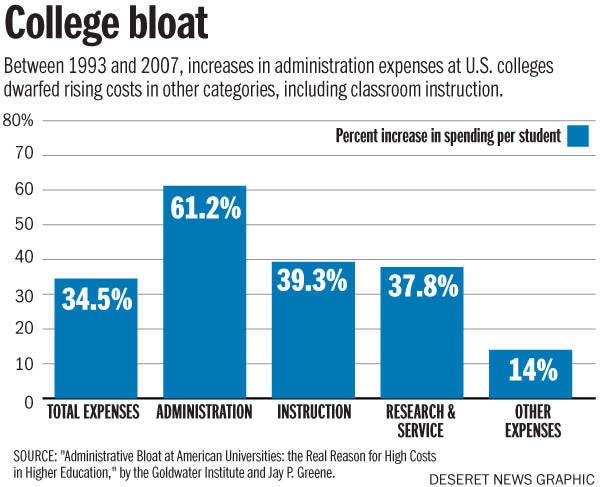America generates too many useless, indebted college graduates
Here’s a plan to reduce college costs and increase opportunity
Something is deeply wrong with American higher education. You can see it in the opinion data. 56% of Americans don’t think a 4-year college degree is worth it[i]. The net approval of higher education swung from +19% in 2015 to -5% in 2022[ii]. The social scientist Jonathan Haidt has laid out the case in The Coddling of the American Mind (2019) that something has gone wrong with campus culture. Indeed, there has been an 130% increase in mental health disorders among college students between 2015 and 2022[iii]. This starts at the top, where there has been a 292% increase in students with mental health disorders at the top 8 liberal arts schools over the last 12 years[iv]. Ad Astra has laid out the full case for why increasing student debt and credentialism are killing opportunity in America. Meanwhile, China is graduating 8x more Science Technology Engineering and Math (STEM) graduates than the US[v]. What is to be done? The solution is to leverage the competitive nature of the American education market and dramatically lower the cost of higher education, starting with our most elite schools.
What is the point of higher education?
At the national level, a more educated workforce is more attractive to employers and makes a nation more competitive. At the individual level, the calculus is simpler: the boost to lifetime wages will be greater than the cost of a degree. Unfortunately, that return on investment has been going the wrong way since 2000.
Figure 1: Rising tuition and falling wages
Return on investment is unique to the skills, degree, and career paths of different individuals. For example, an aspiring tradesman shouldn’t get a 4-year bachelors in philosophy, they should get vocational training or a community college degree. Likewise, an aspiring professor should get a doctorate degree. The combinations of individual skill, degrees, and careers are numerous but the common factor in all cases is that lowering tuition boosts individual educational payoff. America should embrace its diverse market of educational offerings to meet all combinations while enacting policies that leverage competitive dynamics to reduce tuition costs.
Elite schools
Even if tarnished, the top schools in the country still have the best brands in the world and other institutions of higher education look to them for leadership. The reality is that Harvard is the Pepsi and your local community college is the RC Cola of colleges. Recently these brands have been damaged by charges of elitism and ideological radicalism. To rehabilitate their brands, elite schools should change their mission from having an exclusive acceptance rate to maximizing opportunity in America. Here are a few initiatives they could undertake:
· Increase class sizes (exclusivity leads to increasing tuition costs)
· Eliminate aristocratic sports (rowing, squash, fencing, etc.)
· Reduce exorbitant landscaping expenses
· Place core classes online so that other colleges can license them (so a freshman at the University of Kansas can take a course in Western Civ from a professor at Yale)
· Train other higher education and public K-12 teachers during the summer semester
By reframing their mission to maximizing opportunity in America, elite schools can rebuild their damaged credibility and reassume their position as leading national institutions.
Other policy choices
Schools of all kinds should also trim their bloated administrative staffs. Administrative costs per pupil rose 62% from 1993 to 2007[vi]. In the digital age, schools should be as lean as possible; all non-student facing staff should be minimized. State and federal governments should wield their taxpayer funding of educational institutions to enforce cost cutting. This includes both research funding and student loan subsidies. Colleges should also aggressively roll-out AI to act as individual tutors. Trying to understand how the Battle of Waterloo fits into the Global Napoleonic Wars of the 19th century? Ask AI, it read every book, article, and lecture on the topic.
American Exceptionalism
The US has the best network of colleges in the world, an advantage that brings the most talented individual in the world here. Eight of the top ten schools in the US News 2022-2023 Best Global Universities rankings are in America[vii]. We should lean into that advantage and ensure we educate all Americans at home.
In case you missed it - Ad Astra online
[i] https://adastraperaspera.substack.com/p/uneducated
[ii] https://news.gallup.com/poll/508352/americans-confidence-higher-education-down-sharply.aspx
[iii] https://www.discoursemagazine.com/culture-and-society/2023/07/13/the-problem-with-disabling/
[iv] https://www.discoursemagazine.com/culture-and-society/2023/07/13/the-problem-with-disabling/
[vii] https://www.usnews.com/education/best-global-universities/rankings








